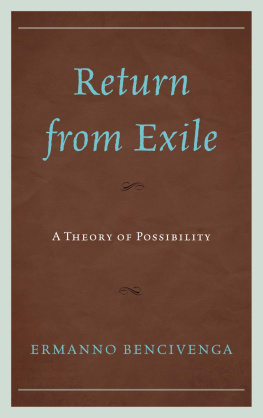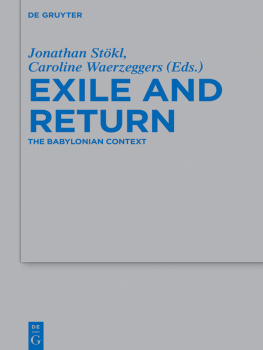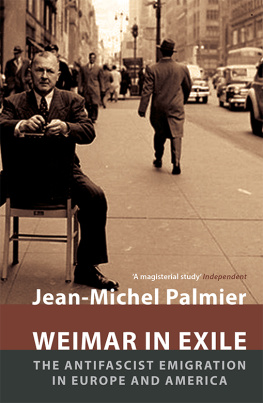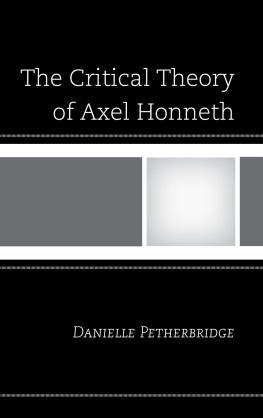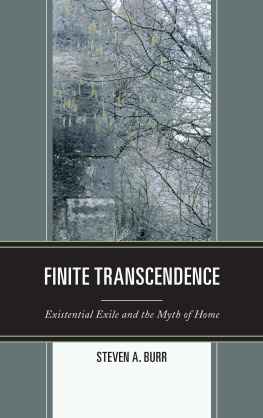Bencivenga - Return From Exile: A Theory of Possibility
Here you can read online Bencivenga - Return From Exile: A Theory of Possibility full text of the book (entire story) in english for free. Download pdf and epub, get meaning, cover and reviews about this ebook. year: 2013;2012, publisher: Lexington Books, genre: Religion. Description of the work, (preface) as well as reviews are available. Best literature library LitArk.com created for fans of good reading and offers a wide selection of genres:
Romance novel
Science fiction
Adventure
Detective
Science
History
Home and family
Prose
Art
Politics
Computer
Non-fiction
Religion
Business
Children
Humor
Choose a favorite category and find really read worthwhile books. Enjoy immersion in the world of imagination, feel the emotions of the characters or learn something new for yourself, make an fascinating discovery.
- Book:Return From Exile: A Theory of Possibility
- Author:
- Publisher:Lexington Books
- Genre:
- Year:2013;2012
- Rating:5 / 5
- Favourites:Add to favourites
- Your mark:
- 100
- 1
- 2
- 3
- 4
- 5
Return From Exile: A Theory of Possibility: summary, description and annotation
We offer to read an annotation, description, summary or preface (depends on what the author of the book "Return From Exile: A Theory of Possibility" wrote himself). If you haven't found the necessary information about the book — write in the comments, we will try to find it.
Return From Exile: A Theory of Possibility — read online for free the complete book (whole text) full work
Below is the text of the book, divided by pages. System saving the place of the last page read, allows you to conveniently read the book "Return From Exile: A Theory of Possibility" online for free, without having to search again every time where you left off. Put a bookmark, and you can go to the page where you finished reading at any time.
Font size:
Interval:
Bookmark:
Return From Exile
Return From Exile
A Theory of Possibility
Ermanno Bencivenga
LEXINGTON BOOKS
Lanham Boulder New York Toronto Plymouth, UK
Published by Lexington Books
A wholly owned subsidiary of Rowman & Littlefield
4501 Forbes Boulevard, Suite 200, Lanham, Maryland 20706
www.rowman.com
10 Thornbury Road, Plymouth PL6 7PP, United Kingdom
Copyright 2013 by Lexington Books
All rights reserved. No part of this book may be reproduced in any form or by any electronic or mechanical means, including information storage and retrieval systems, without written permission from the publisher, except by a reviewer who may quote passages in a review.
British Library Cataloguing in Publication Information Available
Library of Congress Cataloging-in-Publication Data
Bencivenga, Ermanno, 1950
Return from exile : a theory of possibility / Ermanno Bencivenga.
p. cm.
Includes bibliographical references and index.
ISBN 978-0-7391-8523-0 (cloth : alk. paper) -- ISBN 978-0-7391-8758-6 (electronic)
1. Possibility. I. Title.
BC199.P7.B46 2013
123--dc23
2013030951
 TM The paper used in this publication meets the minimum requirements of American National Standard for Information Sciences Permanence of Paper for Printed Library Materials, ANSI/NISO Z39.48-1992.
TM The paper used in this publication meets the minimum requirements of American National Standard for Information Sciences Permanence of Paper for Printed Library Materials, ANSI/NISO Z39.48-1992.
Printed in the United States of America
As a rare exception among its peers, this book contains a record of the exact date in which its writing began. Thanks to so much accounting diligence, and to the fact that the present note is also (though not quite so exactly) dated, indicating the end of the writing process, it is easy to conclude that the bookshort as it istook considerable time to be produced. And yet, that conclusion would ultimately be understated, as production has taken much longer than the actual writing.
What I do here is face head-on one of a cluster of issues that have organized and guided my reflections through my entire career as a thinker. Other members of the same clusterfreedom, play, dialogue, joyhave already had their chance; and those other books, too, bore testimony to a lifetime commitment. For the particular issue I tackle here the commitment appears, in official, chronological terms, even more extensive. For I ventured into thinking as a profession (if that clause makes sense) as a formal logician; and a graduate seminar in modal logicthe logic of necessity and possibilitywas the very first course I taught at UC Irvine, some thirty-four years ago. The appearance is deceptive, of course, as all members of the cluster were always present together; but there is a placenot insubstantial, if modestfor chronological data in ones search for the meaning of ones experience. Here the meaning might be, I suppose, that nothing would work for me unless, first and foremost, it worked logically.
Like a lot of what else I wrote, this book has no footnotes, very few bibliographical references (though plenty of quotes), and most of those are to major figures in the history of philosophy. I know that this practice irritates some, and there is no helping that; all I can say on its behalf is that it is the result of a conscious choice, which I announced a quarter century ago, in the (very short) preface of my The Discipline of Subjectivity. The reason why today any educated person can pick up Platos or Humes dialogues, Descartes meditations, or even Kants or Hegels idealistic pronouncements, read them, and learn from them is that, whatever doctrine or scholarship their authors possessed, they kept it to themselves and did not impose it on their readersas much as they sometimes imposed a forbidding style. For better or for worse, I have tried to write in the same literary genre as those who, for everyone who shares a passion for wisdom, should be the role-modelsindeed, to be inspired by what I regard as the best examples of that genre. I choose my words with extreme care, no less than if they were the symbols of a formal proof; but the criteria of choice involve not just precision and coherence, they also involve the demand that they truly speak to others. I work as hard as I can so that readers can breeze through my texts, understand them, and even enjoy the activity. If some choose to criticize what I write for being breezywell, I just have to live with that. Like everyone else who has a passion for wisdom, I am convinced that the topics I deal with, if not necessarily what I say about them, are of enormous relevance to the human condition, that they concern, or at least should concern, all humans, not just academics. It is the monumental, and monumentally valuable, institution of academia that made it possible for me to devote most of my time to these topics; but what little I have to contribute to them I should present in such a way that those who were not similarly fortunate can still profit from it, that what little grain of truth there is in my thoughts not be obfuscated by a learned jargon and apparatus.
I thank Jeffrey Perl for his careful, constructive, and properly fastidious reading of an earlier version of the book. He will see how much I have gained from it, and how much better the book has become as a result. I dedicate the book to Daniela, who opened up unexpected possibilities for me; and I thank the universal clinamen that I did not blink when she crossed my path.
Irvine, California, June 2013
PHILOSOPHY AND POSSIBILITY
In 1987, in my Philosophy One and Two, I contrasted a philosophy of necessity and one of possibility. The former is a philosophy of absolute constraint: whether it advocates firm reliance on the status quo or a radical alternative to it, its goal is to force us to accept what it advocates, to leave us no choice in the matter. Its archetypal tool is the apodeictic argument, meant to establish that whoever does not walk the line (the only line that can, hence also the one that should, be contemplated) is conceptually confused, mired in contradiction, a laughingstock to rational kibitzers. (A fool, Anselm would have said; and he would have thought that his own apodeictic argument finally proved the fool to make no sense at all, whatever he or others might want to believe.) Its (forever postponedwhich should be telling its supporters something, except that it doesnt) culmination is the system, built step after inexorable step on a foundation more perennial than bronze, encasing a whole area of inquiry, maybe even the whole universe, in the veritable tomb of a definitive account. (The question of what ground the foundation itself has, and the Russellian worry that it might be turtles all the way down, are often left prudently alone; or sneaky diversional tactics are used to hide the whole operations arbitrariness. I will return to this point below, when I get to developing my own theory.)
The philosophy of possibility, on the other hand, does not narrow down our options but rather multiplies them; does not rule out differences but rules them in. It takes something we have become used to seeing in a certain way, so much so indeed that the nightmare of common sense (what philosophers of necessity often invoke when attempting to jump-start their feeble systematic efforts) has coalesced around it, and deserving neighborhoods of respectable citizens (including many deserving academic neighborhoods of respectable scholars) have staked their future on this solid investmentit takes that, I say, and suddenly and irresponsibly throws a new angle on it, to make it look askew, to make us see something else in its stead. And its not a joke, its not to be taken lightly: the tension unearthed by the shocking change of perspective, by the inappropriate phrasing, by the challenge brought against entrenched authority is to be held on to, not released in an outburst of healthy, innocent mirth; while everyone else might indeed try to exorcise the attack with a guffaw or a knowing smile, the philosopher of possibility remains serious and intent, like someone who is really playing, not just horsing around, and does not want to dissipate her energy and concentration in a raging, equalizing din.
Next pageFont size:
Interval:
Bookmark:
Similar books «Return From Exile: A Theory of Possibility»
Look at similar books to Return From Exile: A Theory of Possibility. We have selected literature similar in name and meaning in the hope of providing readers with more options to find new, interesting, not yet read works.
Discussion, reviews of the book Return From Exile: A Theory of Possibility and just readers' own opinions. Leave your comments, write what you think about the work, its meaning or the main characters. Specify what exactly you liked and what you didn't like, and why you think so.

